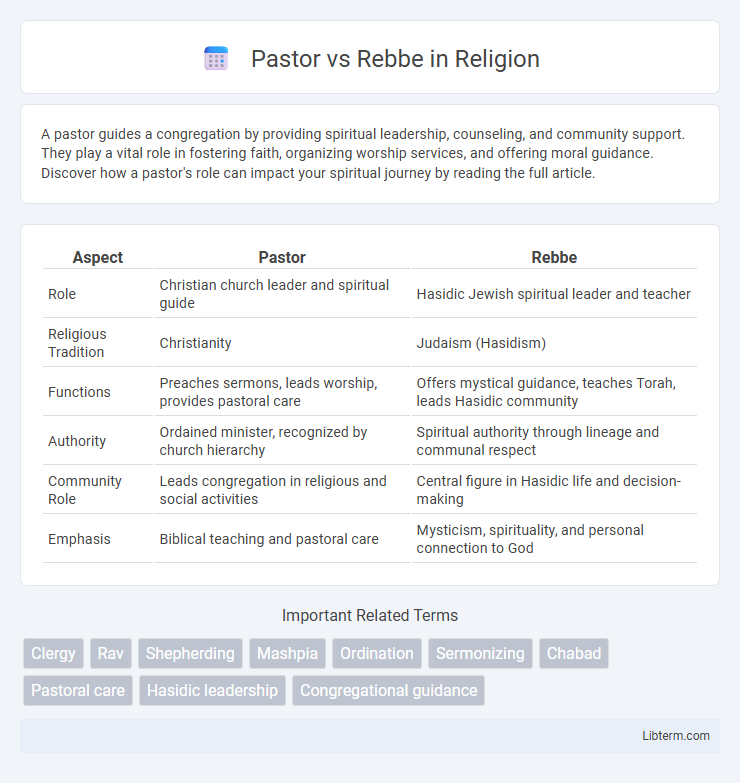A pastor guides a congregation by providing spiritual leadership, counseling, and community support. They play a vital role in fostering faith, organizing worship services, and offering moral guidance. Discover how a pastor's role can impact your spiritual journey by reading the full article.
Table of Comparison
| Aspect | Pastor | Rebbe |
|---|---|---|
| Role | Christian church leader and spiritual guide | Hasidic Jewish spiritual leader and teacher |
| Religious Tradition | Christianity | Judaism (Hasidism) |
| Functions | Preaches sermons, leads worship, provides pastoral care | Offers mystical guidance, teaches Torah, leads Hasidic community |
| Authority | Ordained minister, recognized by church hierarchy | Spiritual authority through lineage and communal respect |
| Community Role | Leads congregation in religious and social activities | Central figure in Hasidic life and decision-making |
| Emphasis | Biblical teaching and pastoral care | Mysticism, spirituality, and personal connection to God |
Defining the Roles: Who is a Pastor? Who is a Rebbe?
A Pastor is a Christian spiritual leader responsible for guiding a congregation, preaching sermons, providing pastoral care, and administering sacraments within churches. A Rebbe serves as a Jewish spiritual leader, particularly in Hasidic communities, acting as a mentor, teacher, and intermediary between the divine and followers, emphasizing mystical teachings and personal guidance. Both roles involve religious leadership but differ in traditions, responsibilities, and the scope of spiritual authority.
Historical Origins of Pastors and Rebbes
Pastors trace their origins to early Christian communities where church leaders, known as elders or overseers, guided congregations and performed sacraments based on New Testament teachings. Rebbes emerge from Jewish Hasidic tradition in 18th-century Eastern Europe, serving as spiritual leaders and teachers who provide mystical guidance and maintain close relationships with followers. Both roles evolved to meet the distinct religious and communal needs within Christianity and Hasidic Judaism.
Core Duties and Responsibilities
Pastors primarily provide spiritual leadership, preach sermons, and offer counseling within Christian congregations, emphasizing teaching biblical principles and guiding church members in faith and moral living. Rebbes serve as both spiritual leaders and communal authorities in Hasidic Judaism, offering religious guidance, interpreting Jewish law, and acting as intermediaries between their followers and God. While pastors focus on sermon delivery and pastoral care, rebbes emphasize mystical teachings, communal leadership, and maintaining tradition within their Hasidic dynasties.
Spiritual Leadership: Contrasts in Approach
Pastors often emphasize sermon-driven guidance, nurturing congregations through biblical teachings and personal counseling within Christian traditions. Rebbes provide spiritual leadership rooted in Hasidic Judaism, offering mystical insights, direct blessings, and communal wisdom that connect followers to divine spirituality. The pastoral approach centers on doctrinal instruction and pastoral care, while Rebbes embody a charismatic role that intertwines spiritual mentorship with deep ritual significance.
Religious Training and Educational Background
Pastors typically receive formal theological education through seminaries or divinity schools, focusing on Christian doctrine, biblical studies, pastoral care, and church leadership. Rebbes undergo extensive religious training in yeshivas, emphasizing Talmudic scholarship, Jewish law (Halacha), mysticism, and community guidance within Hasidic tradition. The educational background of a pastor is often institutional and academic, while a rebbe's training is deeply rooted in lifelong mentorship and spiritual lineage.
Community Engagement and Influence
Pastors often lead congregations through sermons, counseling, and community services, fostering strong local engagement by addressing the spiritual and social needs of their members. Rebbes serve as both spiritual leaders and mentors in Hasidic communities, guiding followers with teachings rooted in Jewish mysticism and creating tight-knit bonds through personal interactions and communal rituals. Both roles wield significant influence by shaping moral values and traditions, yet Rebbes typically maintain a more personalized and hereditary leadership style compared to the often institutional framework surrounding pastors.
Pastoral Care vs. Rebbe Guidance
Pastoral care primarily involves providing emotional support, counseling, and spiritual guidance tailored to individual needs within a Christian community. Rebbe guidance, rooted in Jewish tradition, emphasizes mentorship through Torah study, mystical insight, and personal spiritual development within Hasidic communities. Both roles focus on nurturing faith, but pastoral care centers on practical life challenges while Rebbe guidance fosters deep, personalized connection to Jewish teachings and identity.
Worship Practices and Ritual Leadership
Pastors typically lead worship services centered on sermons, hymns, and communal prayer within Christian congregations, emphasizing scriptural teaching and pastoral care. Rebbes guide Hasidic Jewish communities through traditional rituals, mystical teachings, and personal blessings, serving as spiritual leaders and intermediaries between God and followers. Worship practices under a Rebbe often involve chanting, dance, and observing detailed religious laws, contrasting with pastors' focus on contemporary liturgy and pastoral counseling.
Symbolism and Titles in Christianity and Judaism
The title "Pastor" in Christianity symbolizes a shepherd guiding the spiritual flock, emphasizing care, teaching, and leadership within the congregation. In Judaism, the "Rebbe" holds a more mystical and authoritative role, often seen as a spiritual master and advisor, embodying deep Torah knowledge and personal connection with followers. These titles reflect distinct religious traditions where pastoral care in Christianity centers on community nurture, while the Rebbe's symbolism encompasses both spiritual guidance and esoteric wisdom.
Contemporary Perspectives: Evolving Roles
Pastor and Rebbe roles have evolved significantly in contemporary religious landscapes, reflecting differing approaches to spiritual leadership and community engagement. Pastors often emphasize organizational management and sermon delivery within churches, adapting to modern congregational needs through counseling and social outreach. In contrast, Rebbes maintain spiritual authority rooted in Hasidic tradition, guiding adherents with mystical teachings and fostering intimate community bonds through personal mentorship.
Pastor Infographic

 libterm.com
libterm.com